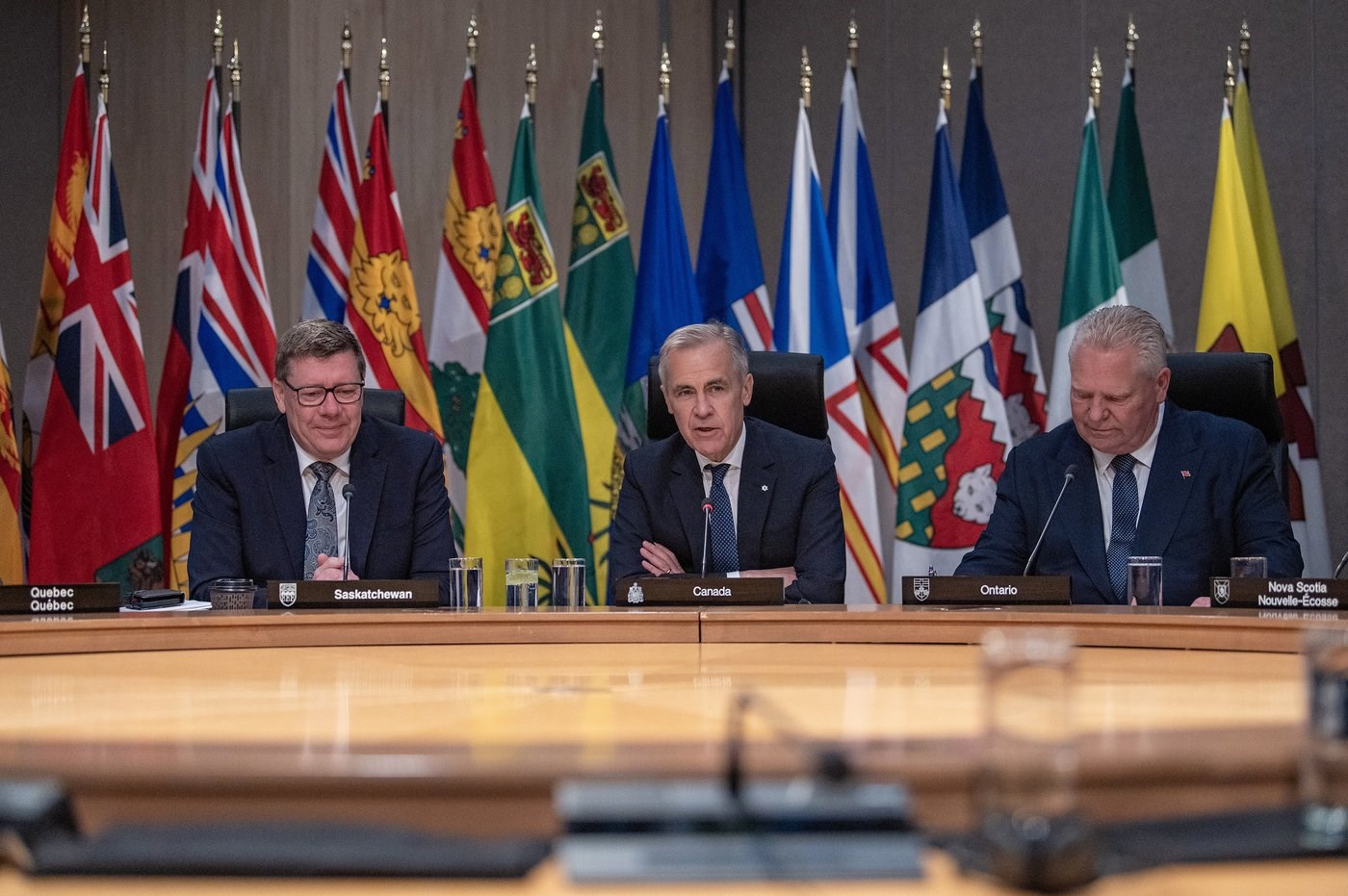
Premier of Saskatchewan Scott Moe, left to right, Prime Minister Mark Carney and Premier of Ontario Doug Ford speak to media during the First Minister’s Meeting in Saskatoon on Monday, June 2, 2025. THE CANADIAN PRESS/Liam Richards
Republished June 03, 2025 - 10:18 AM
Original Publication Date June 02, 2025 - 1:01 AM
SASKATOON — Ontario Premier Doug Ford said Monday's gathering of the country's premiers to talk over nation-building projects with Prime Minister Mark Carney was the "best" they have had in the last decade.
The comments amount to a lightly veiled jab at former prime minister Justin Trudeau, who frequently had frosty relations with the group, especially prairie premiers looking to build out their energy sectors.
Ford said the premiers, and the whole country along with them, stand united as Canada comes under attack from U.S. President Donald Trump's tariffs — even as some in the group scrapped over well-worn pipeline politics.
Provincial and territorial leaders sat down with Carney in Saskatoon on Monday and each premier came armed with wish lists of major projects they hope the federal government will deem to be in the national interest, then fast track for approval.
"The point is to build the certainty, the stability and the ambition that builders need to catalyze enormous investment — investment to make Canada into an energy superpower," Carney said at the closing news conference.
While the group mulled over a number of potential "nation-building" natural resource and infrastructure developments in private, they did not release a final list afterward that would show they accomplished something concrete.
Still, Ford said there is no reason to take that as a bad sign.
"Nothing was carved in stone at this meeting," he said, adding he had no expectations the prime minster would approve specific projects at this meeting.
"I described him today as Santa Claus. He's coming and his sled was full of all sorts of stuff. Now he's taking off back to the North Pole and he's going to sort it out and he's going to call us."
The federal Liberals have yet to reveal in Parliament their promised legislation to speed up approvals for select projects to a maximum of two years. That could be tabled as early as this week.
When he was pressed on the lack of specifics after the meeting, Carney told reporters he could name lots of examples of contenders.
He then rattled off a list that included the Grays Bay Road and Port, which would connect southern Canada to the Arctic by road, along with the Ring of Fire mining project in northern Ontario. Notably, he name dropped the Pathways Alliance oilsands project, though he did not commit to any.
Carney said the group would refine what should count as priority projects over the summer months and touted that as "private proponents become aware of the opportunity here, we're going to see more projects coming forward."
He said the upcoming federal legislation will also mandate meaningful consultation with Indigenous Peoples, including in which projects get picked and how they are developed.
Alberta Premier Danielle Smith went into the meeting warning that any list that doesn't include new pipelines would send a bad message to her province.
She left the meeting on a positive note, saying it's up to political leaders to find a proponent for a new pipeline and that she's willing to give this process a chance.
"I'm encouraged by the immediate change of tone that we've seen from recent months," she said. "When we hear the prime minster talking about being an energy superpower, we haven't heard that language for some time."
Carney made a point to specify that "decarbonized" barrels of oil would be "within the broader context of national interest."
"Yes, there's real potential there," he said. "It took up a good deal of our time in discussions with potential to move forward on that. If further developed, the federal government will look to advance it."
Smith touted the Pathways Alliance project, a group of major Canadian oilsands companies that argues it can fight climate change through using carbon capture and storage to reduce emissions, as a way to do that.
"There's lots of ways to decarbonize, but the Pathways project is an expensive project," she said.
"It would cost anywhere from $10 to $20 billion to get built. And to make the economic case for that, having more egress with more barrels to be sold to Asia is going to pay for it. If we had a million-barrel-a-day pipeline going to the northwest B.C. coast, that would generate about $20 billion a year in revenues, and so that seems like a pretty good value proposition."
But headed into the meeting, B.C. deputy premier Niki Sharma said Smith's proposal for a bitumen pipeline to B.C.'s northern coast, such as by reviving the stalled Northern Gateway, has "no proponent" at this stage.
“We are focusing on these shovel-ready projects, not theoretical projects with no proponents," Sharma said in a statement sent afterward. "There is also an existing, underused pipeline Canadian taxpayers paid $34 billion for, with capacity to spare."
This report by The Canadian Press was first published June 2, 2025.
News from © The Canadian Press, 2025